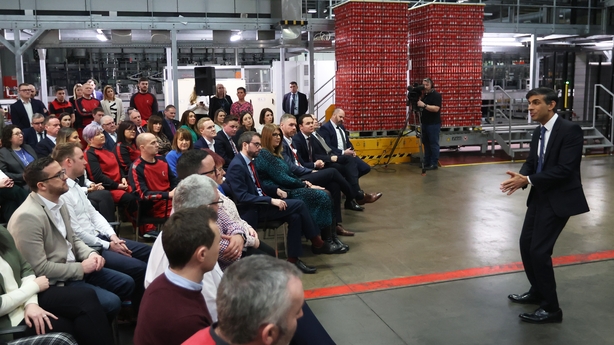It is all about pets, sausages and beer.
The British government's document explaining the Windsor Framework makes frequent references to the transit and trade of animals and products that are staples of British life.
At the heart of the new proposals are commitments to replace the border down the Irish Sea with new arrangements.
They would allow seamless trade between the UK and Northern Ireland, as long as the goods remain in the six counties.
Critically, the same VAT and excise rules that apply in England, Scotland and Wales will take effect in the North.
Under the Northern Ireland Protocol as it stands, European rules automatically apply to the six counties.
That is because the North has full access to the EU market.
Under the new arrangements, goods going from Britain into Northern Ireland will be divided into a Green Lane, which will be destined for the market in the North, and a Red Lane destined for the Republic, which will be subject to normal checks.
It means that trade between the UK and the North will be based on British internal market rules.
The new Windsor Framework contains a new arrangement that effectively allows the UK government to veto the application of new EU rules to Northern Ireland.
It is called the Stormont brake.
It can only be triggered if 30 members of the Stormont Assembly from two parties or more come together to sign a petition.

Obviously, the Assembly needs to be sitting for that to happen (it is currently suspended.) But there are some significant caveats.
It can only be used when the new EU rule would have a "significant and lasting impact specific to everyday lives of communities" in the North.
And it can only be triggered "in most exceptional circumstances and as a matter of last resort", according to officials.
Before it is deployed the British authorities would have to see if there are any other routes to resolve the issues.
According to UK government documents, once the UK notifies the EU that the brake has been triggered, the rule in question is suspended automatically from coming into effect.
It can only be introduced in Northern Ireland if UK and EU both agree to do so.
That effectively gives the British government what it called "unequivocal veto", which permanently stops the rule being applied.
This mechanism is not subject to oversight by the European Court of Justice, which has been a key issue for the DUP.
Instead, any dispute would be resolved through "independent arbitration according to international not EU law".
There is another important note in the new agreement.
It says: "It is important to note that the permanent disapplication of the rules would mean divergence between Northern Ireland and Ireland (and the broader EU), and thus it would be a matter for the EU how to deal with the consequent impact on their market."
It adds Brussels will have the ability to take appropriate remedial measures.
That sounds like in an extreme situation there could be serious consequences in the event of serious dispute between the EU and UK.
And that could have a big impact on Ireland.






